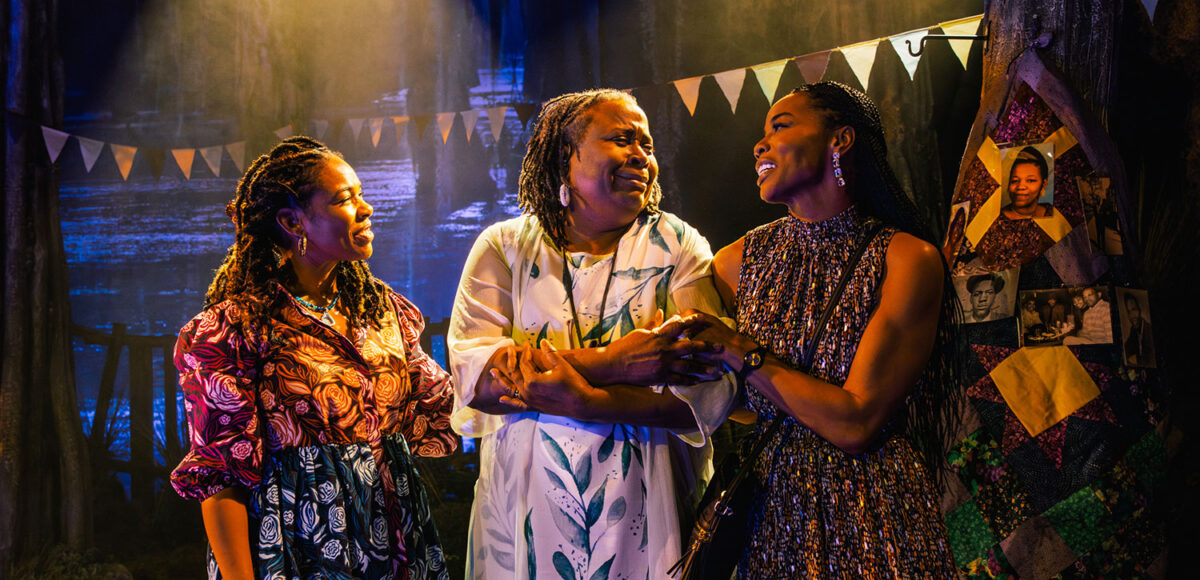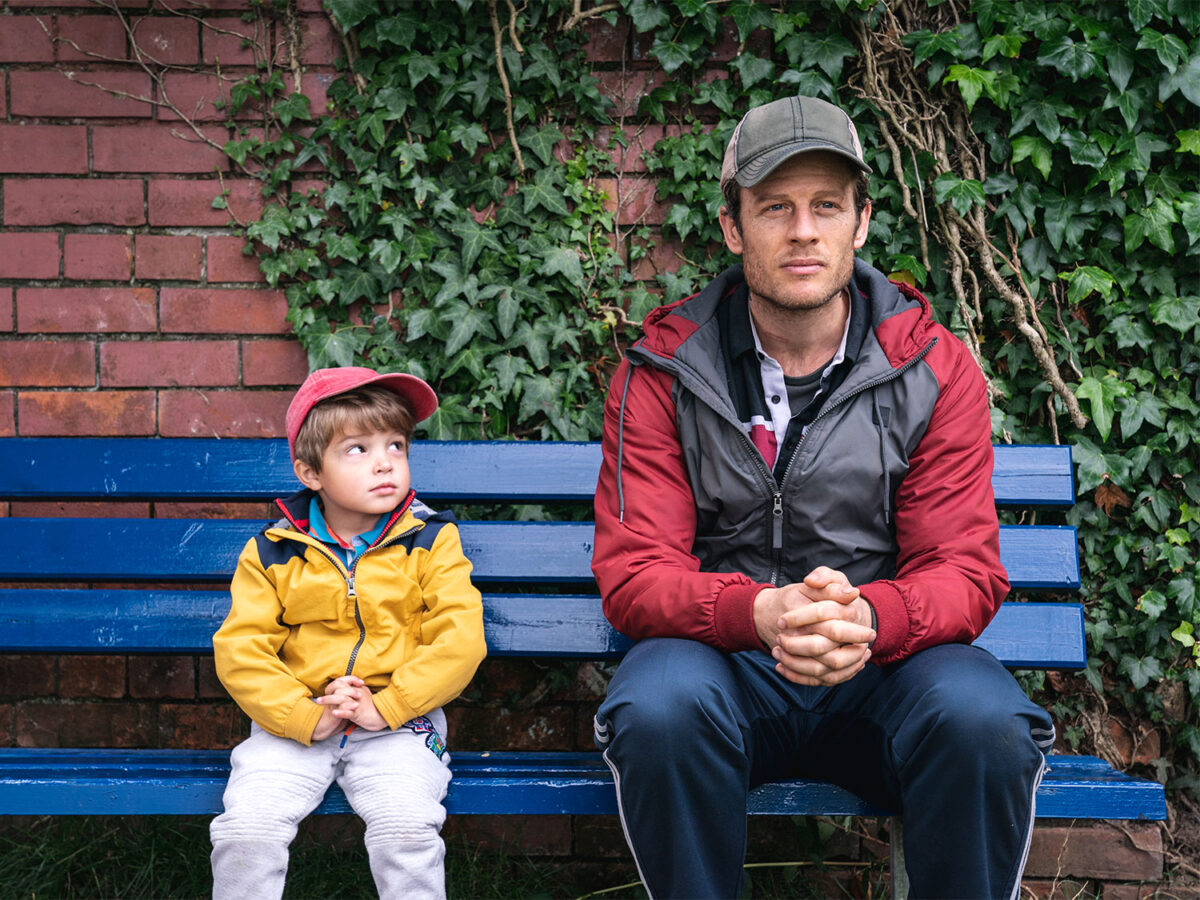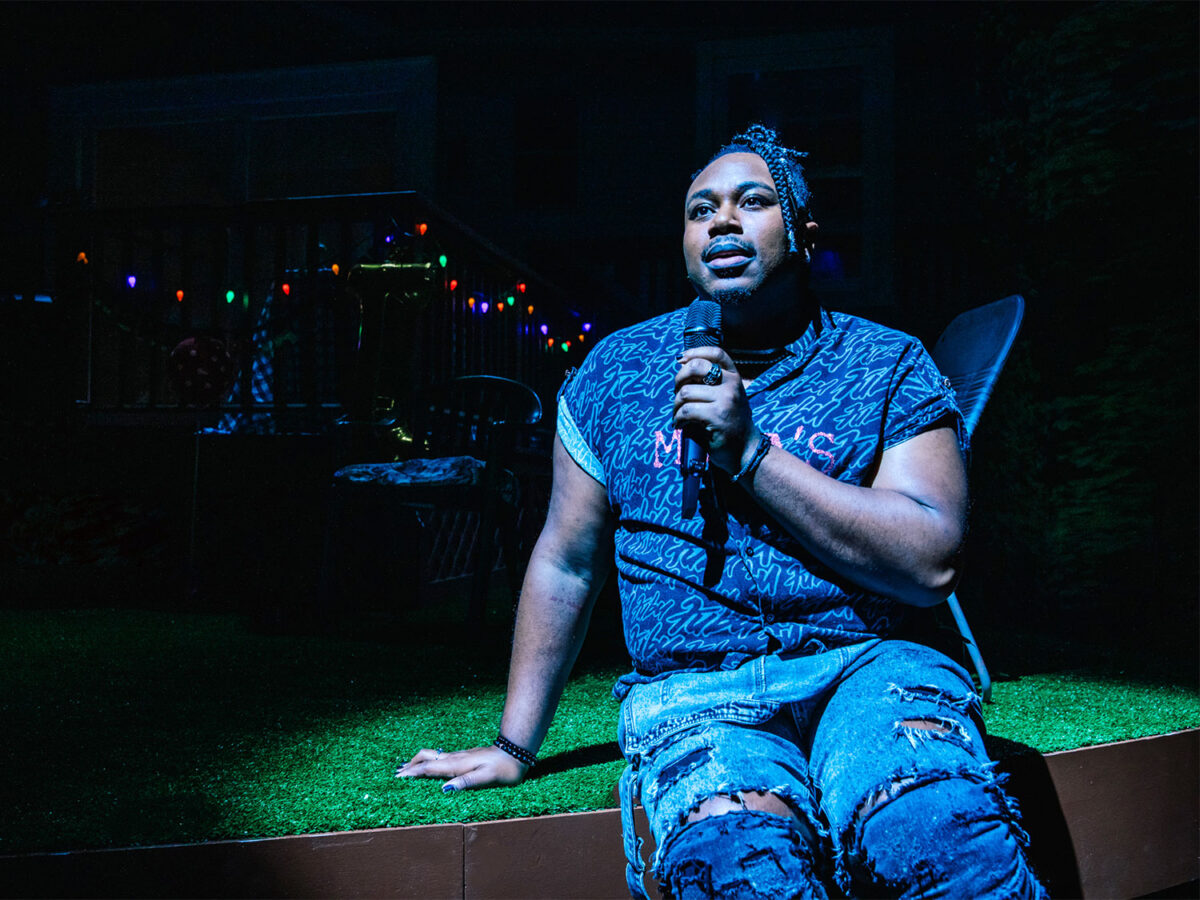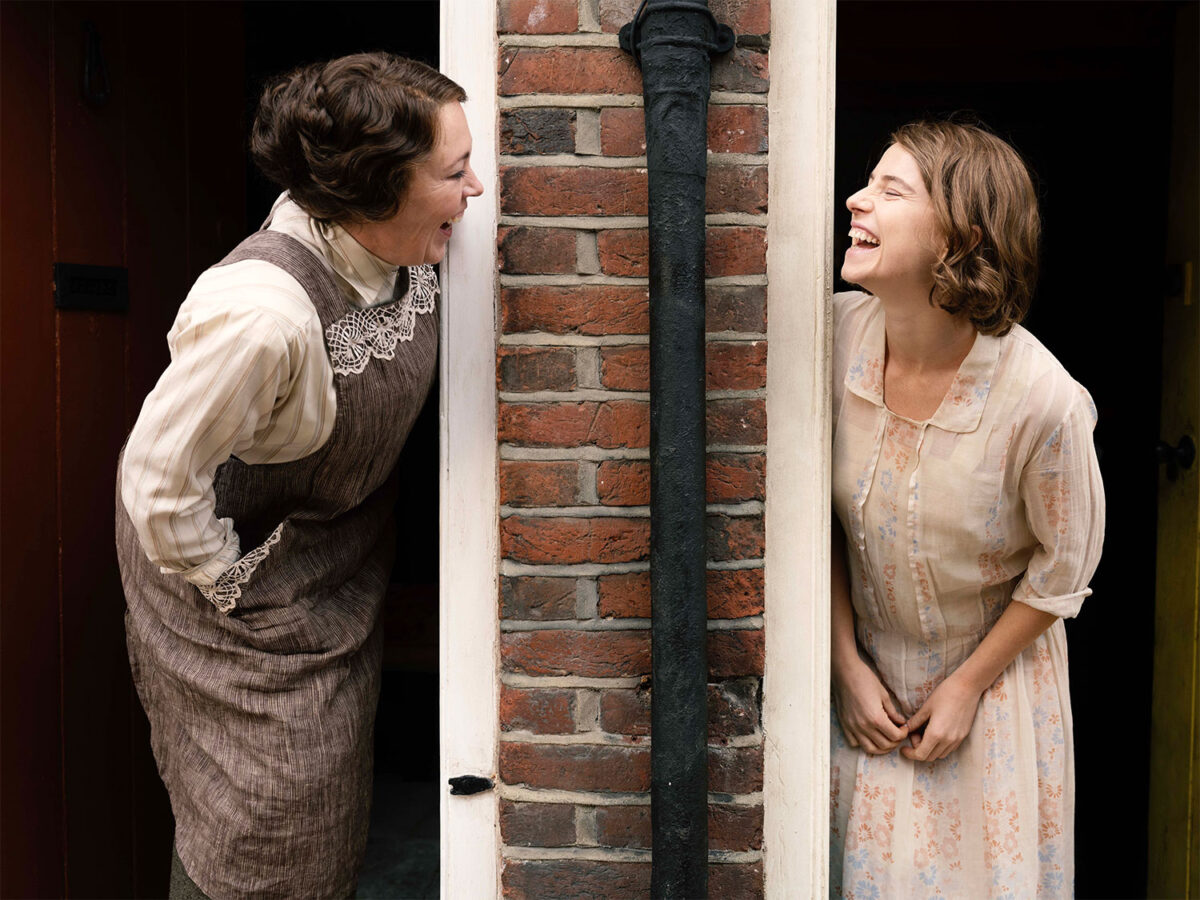World premiere plays by relatively unknown young playwrights can be risky and it was with some trepidation that I entered the Audrey Skirball Kenis Theater at the Geffen Playhouse to attend, or as it turns out, be enveloped by “Black Cypress Bayou” by Kristen Adele Calhoun. Squeezing through the narrow aisles to your seat, you take in Laurence E. Moton III’s truly fabulous set. Recreating a swamp in the East Texas bayou with tall cypress trees, their huge sinewy, connected roots and moss-hung branches inhabit the small stage. In one corner sits LadyBird Manifold, fishing pole in the creek and smile on her face. Enter Vernita Manifold, her mother, agitated, large towel-covered plastic basket in hand, looking from side to side, ready to quarrel with her daughter.
It’s not that LadyBird wasn’t expecting her mother but she thought they were going to fish in the late night hours and her mama didn’t bring her own pole. “Why isn’t your sister here?” Vernita demands. “Call her now and get her over here.” But LadyBird is in no hurry and wants answers. What’s going on? What’s in the basket? Why didn’t you bring your pole? This tug-of-war between mother and daughter is not new. LadyBird is a rule follower. She’s masked and insists on distance from a mother who’s never seen a rule she didn’t want to break or a boundary to breach. Vernita, like so many others, is convinced that if she hasn’t gotten sick by now, she’s not going to. Everyone who’s going to die has already died, she insists. It’s already taken half the town.
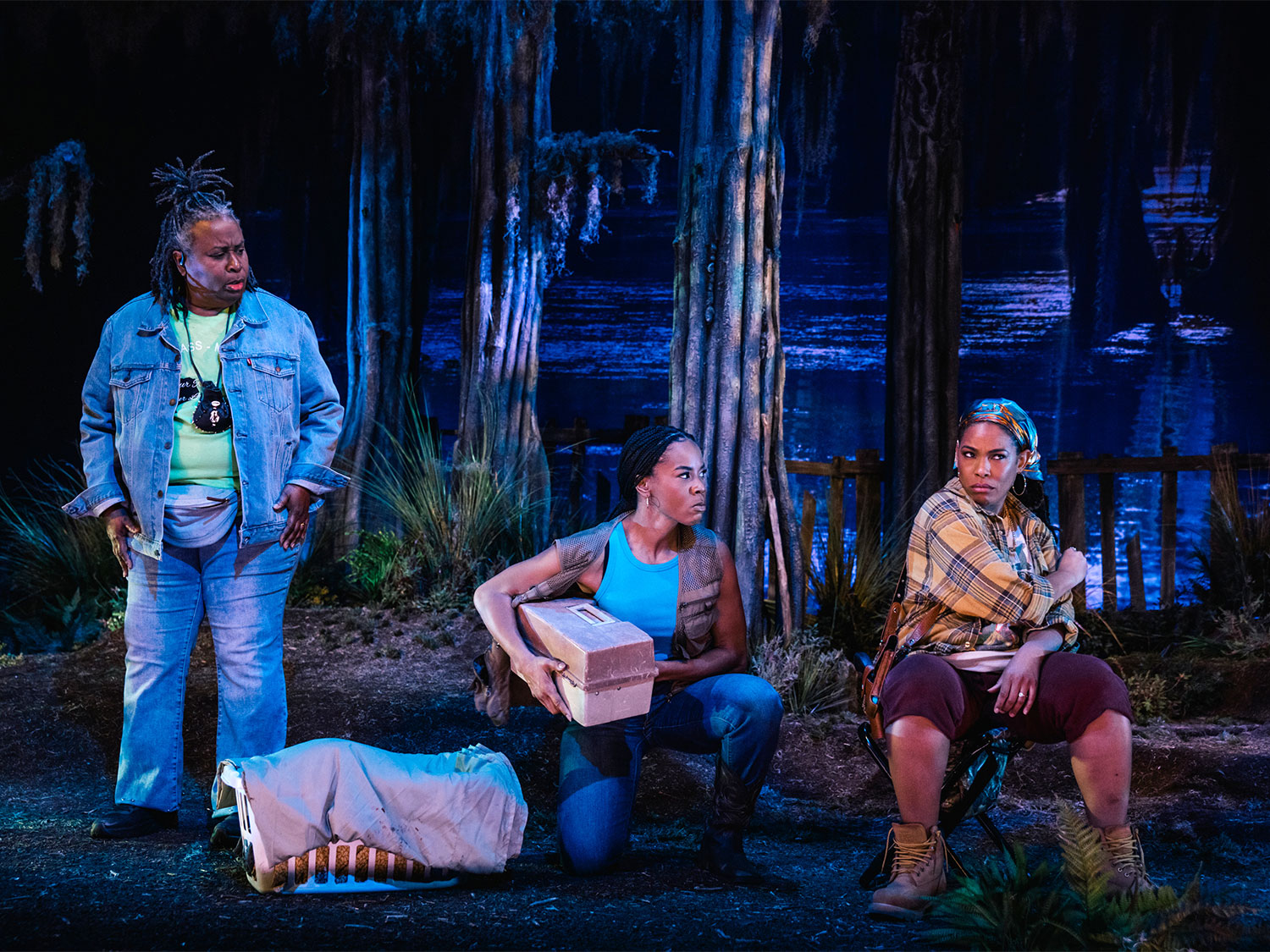
Photos by Jeff Lorch
But back to that pesky basket, being guarded so carefully by Vernita, and the mysterious blood on her hands. As LadyBird pulls back the towel, she yelps and turns away to vomit. Her mother stares her down. “Don’t you dare throw up, girl. We don’t need another mess to clean up tonight.” As Mama explains it, they need Meka, her other daughter, right now. She’ll know what to do because she’s acquainted with criminal activities. Although Meka considers herself a healer, and they could definitely use some of that right here and now, she’s partial to weed, medicinal and otherwise; the otherwise being illegal in Texas. Finally arriving, she’s less than clear-eyed, having spent the evening puffing away with her husband in their new hot tub.
The head? It belongs, or rather belonged, to Clayton Rutherford, the owner of just about everything in the town including the slaughterhouse and factory, both of which he shut down. Earlier, when there was a fire at the factory and workers died because the exits were chained shut, he offered no compensation. He owned the housing his workers lived in and the grocery stores they shopped in. Job or no job, they all owed him money and he demanded payment. But now he’s dead and Vernita has been caught red-handed, literally and figuratively.
The Rutherfords have been inextricably tied to Vernita’s family for generations. After the Civil War, Vernita’s beloved ancestors briefly rented Rutherford land, earning enough with their cotton crop to think about buying it. They had a gift for growing cotton, but that gift brought out greed and injustice in the town folk, especially Big Rutherford who controlled the sheriff, his cronies and just about everyone else in town. Demanding payments that weren’t due, Mama Ada and Papa Gee stood their ground and refused to pay. A gun battle ensued and many died. But that wasn’t enough. Rutherford’s men came in the night and hanged seven of the survivors, including Papa Gee, and stole a year’s worth of cotton.
Inexplicably, most of the white men who exacted vengeance on the innocent Blacks went missing. Soon only their heads turned up. But Big Rutherford was untouched and the order of the day was restored. Ada, single minded of purpose, was determined to get that land back; she never did. Vernita shivers telling this story because here, after many years, is the head of the man whose descendent built his crooked empire on the backs of her relatives.
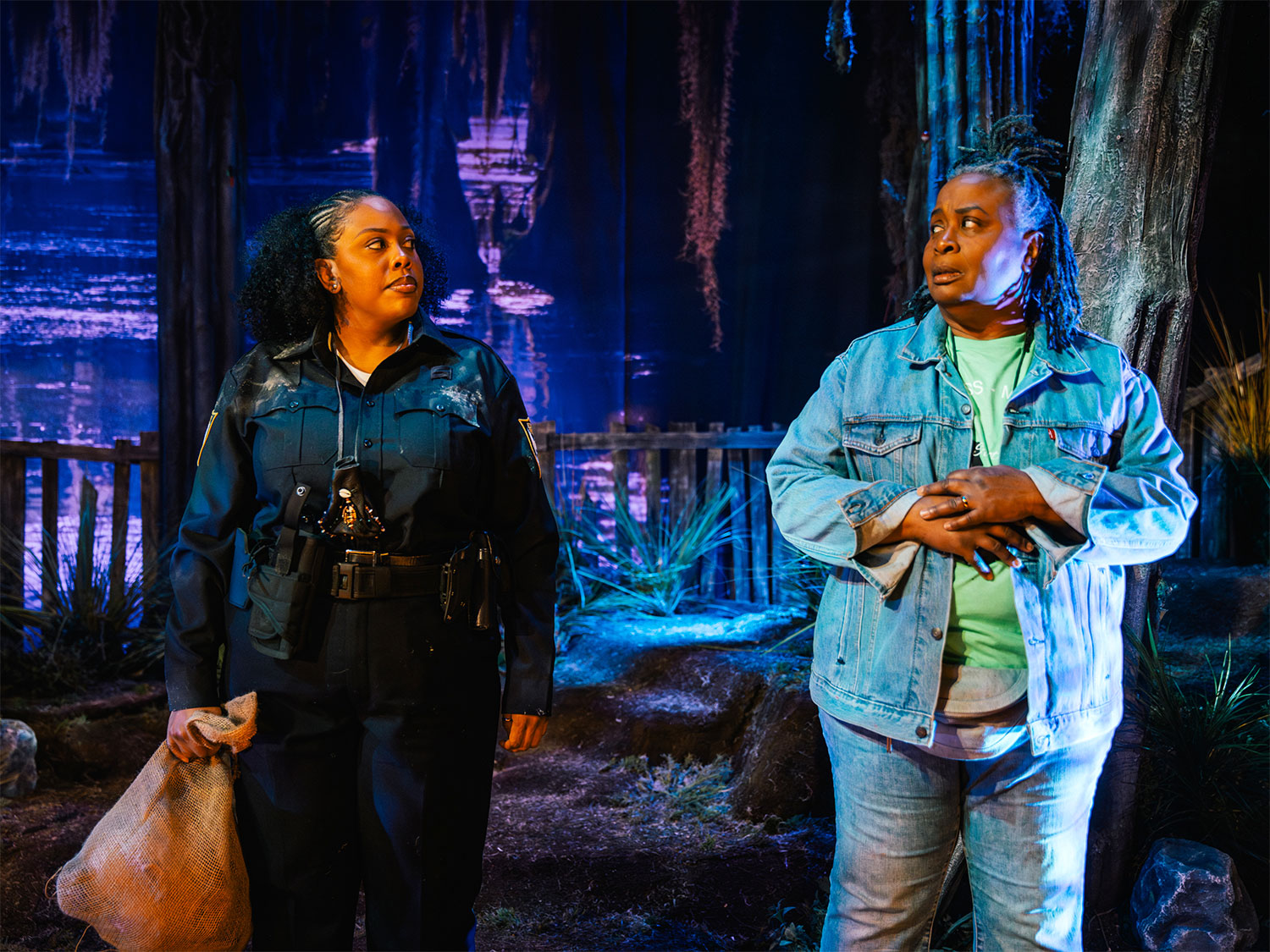
Vernita, recounting this tale and others, reveals her ties to the folklore tradition inhabited by ghosts and spirits, both vengeful and forgiving. As she tells the girls “What do we believe about our dead?” Meka responds, “That they come back until they work is done.” They provide spiritual protection. As her daughters listen to these phantasmagoric stories, there is a disturbing rustling in the trees. An outsider emerges, one seemingly unknown and possibly hostile to this family. But the stranger, Taysha, is not unknown and she shares a bond with the three of them that will shatter their grasp on reality.
Calhoun has written a story that is deeply infused with a mythical spirituality, an African American magical realism. She has linked the folkloric tales of Vernita to the genealogy of her family. The stories were a way to connect to the past and rise above the future. In setting her play during the pandemic, she has made it a metaphor for the illness that has affected so many of the racists that populated this red neck of the woods. Lynching, Jim Crow laws, beatings and killings by the police are, in their own ways, a pandemic that affected the lives of African Americans since slavery. But the lingering effects of this type of pandemic are not on the Blacks, but on those who perpetrated these injustices, infecting their souls. Here, the beheadings are the spiritual retaliation for past sins.
This tale of retribution by unseen forces was the central theme of Percival Everett’s outstanding novel, “The Trees.” The mystery and solution to who will ultimately face justice is in the trees, from whose branches hung the strange fruit, those lynched for the crime of being Black. Tracking down and exacting revenge on the perpetrators is by a mysterious group, all of whom are hiding in plain sight. Much like the initial retaliation for justice in “The Trees,” the so-called murder of Clayton Rutherford is to avenge the past misdeeds of his ancestors. That he, himself, is unredeemable is icing on a poisonous cake. Swiftly directed by Tiffany Nichole Greene, Calhoun largely succeeds in couching her story in folklore by telling this story speedily, at times a bit too quickly, with a mordant sense of humor. It is, most assuredly, a black comedy (an unavoidable pun). Unnecessary, however, is the disdain shown by all but LadyBird for the real need to protect oneself during a pandemic. She needlessly plays on the ignorance of the consequences of ignoring health concerns as if it is LadyBird who is superstitious rather than Vernita and Meka who play into the trope that the virus was not real.
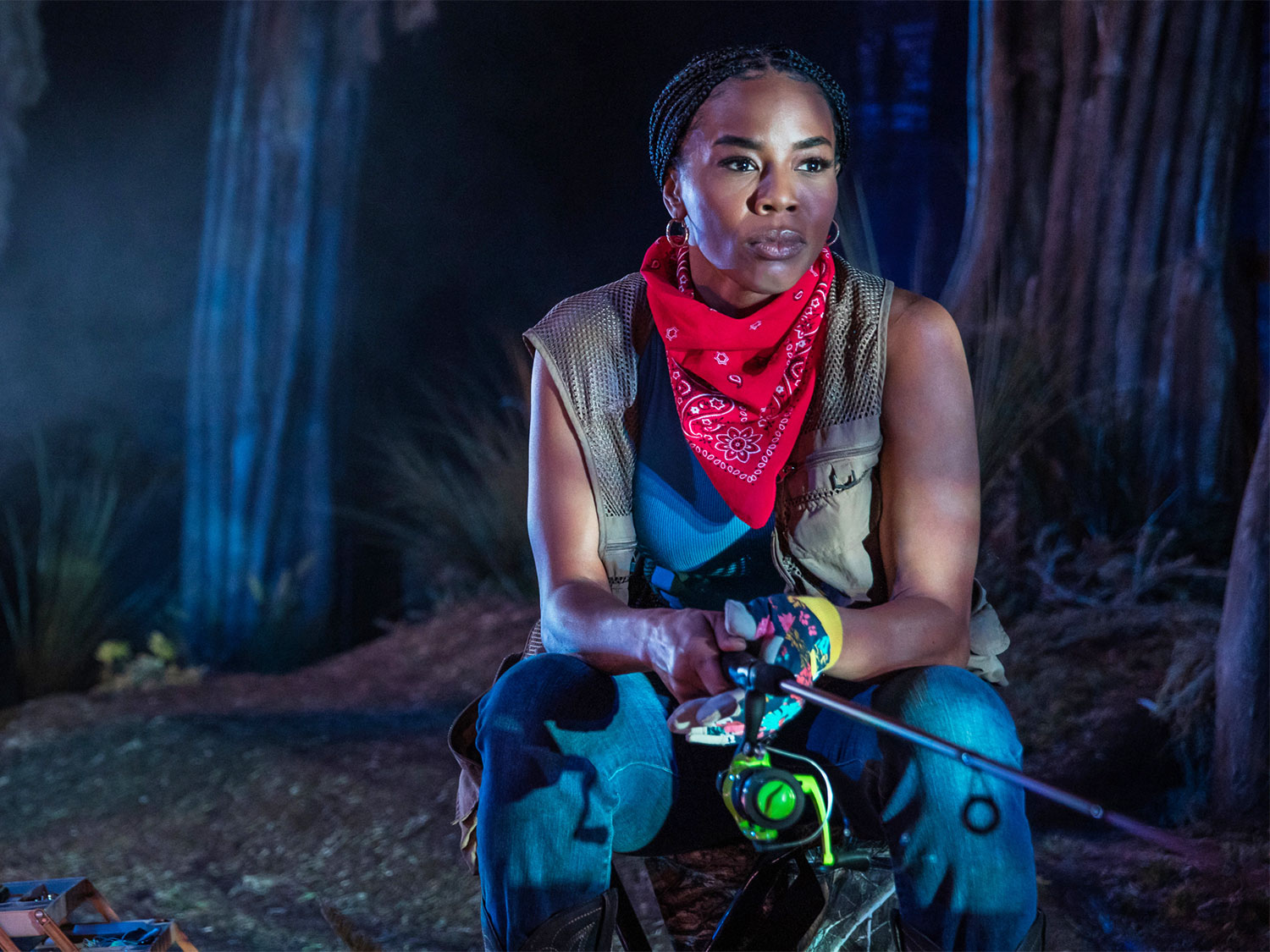
Brandee Evans, LadyBird, a rigid rule follower played for exaggeration, is excellent, a voice of reason in real time and an astute listener about the past. Angela Lewis is the humorous Meka whose only purpose may be to keep us engaged as the mystery of the head starts to play out. Perhaps it is the role or the writing, but her character doesn’t contribute needed substance to the plot. She moves the story along without adding a great deal to it. Amber Chardae Robinson is the mysterious Taysha. It is something of a thankless and yet pivotal role, pushing Vernita to acknowledge her own shortcomings and sins and move on. It is a difficult character to portray because of the “other worldliness” demanded and at times she is not as convincing as she needs to be. The group is led by Kimberly Scott as Vernita. Although she occasionally stumbled over her lines, interrupting the necessary rhythm, she effectively portrays an older lady dependent on both church going and respect for the spirits of the past, and I don’t mean the Holy Ghost. She is most effective when cornered, angry and upset, which is most of the time.
I enjoyed the show and, having recently read “The Trees,” I especially liked the tangible comparisons in the material. If you’re going to be influenced, even if it’s subliminal, I can think of no better role model than Percival Everett.
Now playing at the Geffen Playhouse’s Audrey Skirball Kenis Theater through March 17. Performances take place Wednesday through Sunday, with matinees on Saturdays and Sundays. Run time is 80 minutes without intermission.
Geffen Playhouse, 10886 Le Conte Ave, Los Angeles, 90024
Neely Swanson spent most of her professional career in the television industry, almost all of it working for David E. Kelley. In her last full-time position as Executive Vice President of Development, she reviewed writer submissions and targeted content for adaptation. As she has often said, she did book reports for a living. For several years she was a freelance writer for “Written By,” the magazine of the WGA West, and was adjunct faculty at USC in the writing division of the School of Cinematic Arts. Neely has been writing film and television reviews for the “Easy Reader” for more than 10 years. Her past reviews can be read on Rotten Tomatoes where she is a tomato-approved critic.



